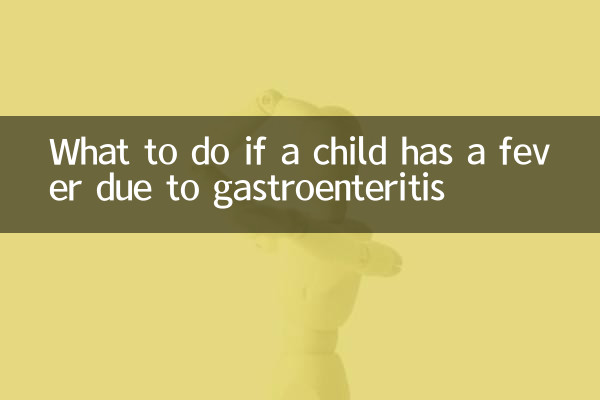What to do if a child has a fever due to gastroenteritis
Recently, gastroenteritis and fever in children have become a hot topic of concern for parents. With seasonal changes and irregular diet, the incidence of gastroenteritis in children increases, and many parents feel anxious about this. This article will provide you with structured data and practical suggestions based on hot content from the entire Internet in the past 10 days.
1. Common symptoms of gastroenteritis and fever

Gastroenteritis is usually accompanied by the following symptoms, and parents need to monitor them closely:
| Symptoms | frequency of occurrence | degree of danger |
|---|---|---|
| Fever (37.5℃-39℃) | 85% | medium |
| Diarrhea (more than 3 times a day) | 90% | medium |
| Vomiting | 75% | medium |
| abdominal pain | 60% | Mild |
| Loss of appetite | 80% | Mild |
2. Home care measures
When a child develops a fever due to gastroenteritis, parents can take the following measures:
| Care steps | Specific operations | Things to note |
|---|---|---|
| hydration | Feed warm water or oral rehydration salts in small amounts and frequently | Avoid drinking large amounts of water at one time |
| Body temperature monitoring | Measure body temperature every 2 hours | Temperatures above 38.5℃ require medication to cool down |
| diet modification | Light liquid food (such as rice soup, gruel) | Avoid greasy, raw and cold food |
| Rest environment | Keep indoors ventilated and at a suitable temperature | Avoid over-wrapping |
3. Drug treatment suggestions
According to the doctor's advice, the following drugs can be used appropriately:
| drug type | Representative medicine | Instructions for use |
|---|---|---|
| antipyretics | Ibuprofen, acetaminophen | Use when body temperature ≥38.5℃ |
| antidiarrheal medicine | Montmorillonite powder | Take dose according to body weight |
| Probiotics | Bifidobacterium etc. | Regulate intestinal flora |
| rehydration salts | Oral rehydration solution III | Prevent dehydration |
4. When Do You Need Medical Treatment?
You should seek medical attention immediately if:
| red flag | Possible reasons | Urgency |
|---|---|---|
| Persistent high fever (>39℃) | severe infection | urgent |
| Frequent vomiting (>5 times/day) | electrolyte imbalance | urgent |
| bloody or dark stools | gastrointestinal bleeding | urgent |
| listless | severe dehydration | urgent |
| Significant decrease in urine output | Kidney function affected | urgent |
5. Preventive measures
Prevention is better than cure, parents should pay attention to:
| Precautions | Specific methods | Effect evaluation |
|---|---|---|
| Food hygiene | Food is heated thoroughly and tableware is disinfected | Reduce infection risk by 80% |
| personal hygiene | Wash your hands frequently, especially before eating and after using the toilet | Reduce infection risk by 70% |
| Vaccination | Rotavirus vaccine (for children of appropriate age) | Prevent certain types of gastroenteritis |
| Avoid cross infection | Isolation during illness | Reduce the risk of transmission |
6. Expert advice
According to recent interviews with pediatric experts, special reminder:
1.Don’t use antibiotics carelessly: Most gastroenteritis is caused by viruses, and antibiotics are ineffective and may worsen diarrhea.
2.Watch for symptoms of dehydration: Children's dehydration progresses quickly, and signs such as dry lips and sunken eye sockets should be closely observed.
3.Gradually resume eating: After the symptoms are relieved, start with the BRAT diet (banana, rice, apple puree, toast) and gradually return to a normal diet.
4.stay patient: Gastroenteritis recovery usually takes 3-7 days, avoid frequent changes in treatment plans.
Through the above structured data and professional suggestions, we hope to help parents scientifically deal with the problem of gastroenteritis and fever in their children. Remember, when symptoms are severe or persist, it is important to seek medical attention promptly to avoid delaying treatment.

check the details

check the details